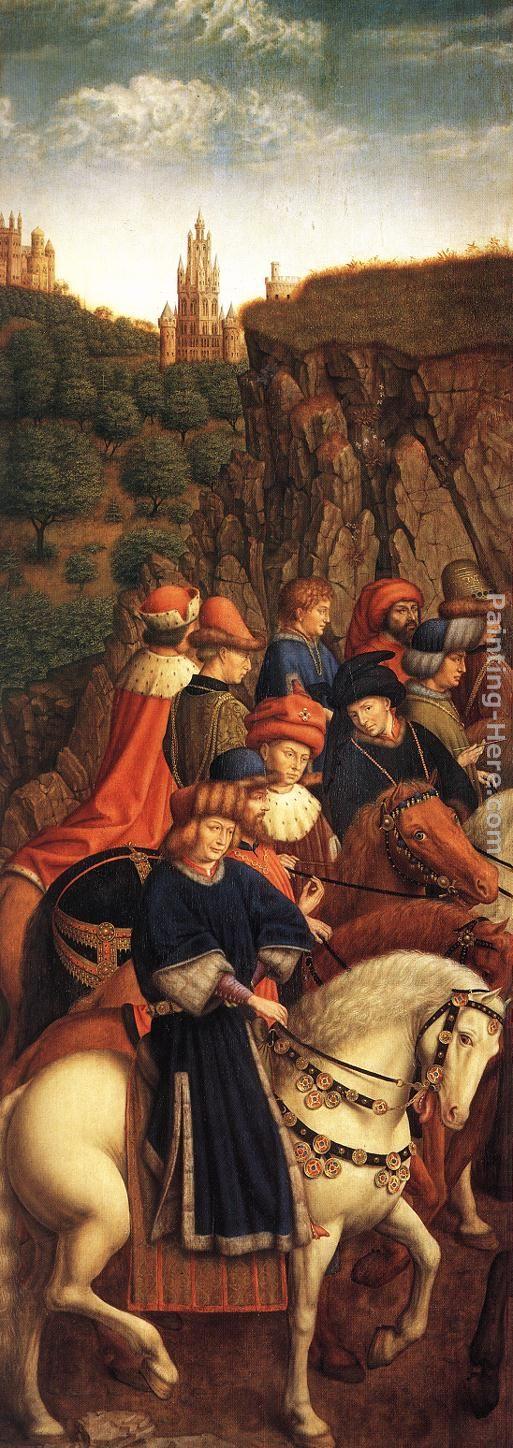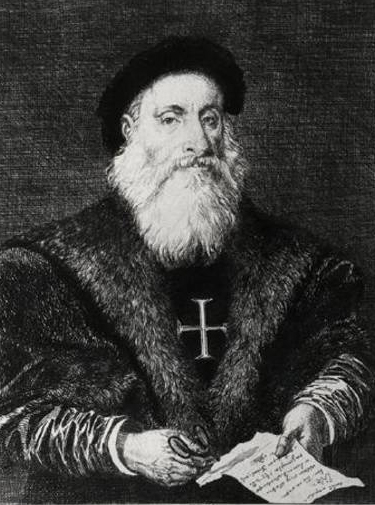Camus liked referring to paintings in his writing.
For example, the sly & comical way he introduces Van Eyck's The Just Judges into La Chute (The Fall )*.
 |
| The Just Judges (full length) |
|
|
 |
| The Just Judges (the group of figures) |
|
|
" A propos, voulez-vous ouvrir ce placard, s'il vous plaît. Ce tableau oui, regardez-le. Ne le reconnaissez-vous pas ? Ce sont Les juges intègres . Vous ne sursautez pas ? Votre culture aurait donc des trous ? Si vous lisiez pourtant les journaux, vous vous rapelleriez le vol, en 1934, à Gand, dans la cathédrale Saint-Bavon, d'un des panneaux du fameux retable de Van Eyck, L'Agneau mystique . Ce panneau s'appelait Les Juges intègres . Il représentait des juges à cheval venant adorer le saint animal. On l'a remplacé par une excellente copie, car l'original est demeuré introuvable. Eh bien, le voici. Non, je n'y suis pour rien. Un habitué de Mexico-City , que vous avez aperçu l'autre soir, l'a vendu pour une bouteille au gorille, un soir d'ivresse. J'ai d'abord conseillé à notre ami de l'accrocher en bonne place et longtemps, pendant qu'on les recherchait dans le monde entier, nos juges dévots ont trôné à Mexico-City , au-dessus des ivrognes et des souteneurs. Puis le gorille, sur ma demande, l'a mis en dépôt ici. Il rechignait un peu à le faire, mais il a pris peur quand je lui ai expliqué l'affaire. Depuis, ces estimables magistrats font ma seule compagnie. Là-bas, au-dessus du comptoir, vous avez vu quel vide ils ont laissé."
- La Chute , p. 134-5, Editions Gallimard
"By the way, will you please open that cupboard ? Yes, look at that painting. Don't you recognise it ? It is The Just Judges. That doesn't make you jump ? Can it be that your culture has gaps ? Yet if you read the papers, you would recall the theft in 1934, from the Saint-Bavon cathedral at Ghent, of one of the panels of the famous Van Eyck altarpiece, The Adoration of the Lamb . That panel was called The Just Judges . It represented judges on horseback coming to adore the sacred animal. It was replaced by an excellent copy, for the original was never found. Well, here it is. No, I had nothing to do with it. A frequenter of Mexico City - you had a glimpse of him the other evening - sold it to the gorilla for a bottle, one drunken evening. I first advised our friend to hang it in a place of honour, & for a long time, while they were being looked for throughout the world, our devout judges sat enthroned at Mexico City above the drunkards & the pimps. Then the gorilla, at my request, put it in custody here. He baulked a little at doing so, but he got a fright when I explained the matter to him. Since then, these worthy magistrates form my sole company. At Mexico City , above the bar, you saw what a void they left."
- The Fall , p.94-5, Penguin 1963, trans. Justin O'Brien
[*La Chute consists of a monologue by a man called Jean-Baptiste Clamence addressed over some time & in different circumstances to a companion who you never find out who it is exactly: in effect the reader is this companion, the one being talked to. To describe La Chute some more, I am going to quote the blurb on the back of my English edition: "Jean-Baptiste Clamence, a successful Paris barrister, appeared to himself & to others the epitome of good citizenship & decent behaviour. Suddenly a handful of circumstances explode his sleek self-esteem, & he sees through the deep-seated hypocrisy of his existence to the condescension which motivates his every action. Running from this discovery first into debauchery, then into self-judgement, he finally settles in the fog-bound wilderness of Amsterdam's waterfront where, a self-styled 'judge penitent', he describes his fall to a chance acquaintance." Mexico City is the name of the bar Clamence frequents, & where he first meets the person who is the addressee of the novel. The Gorilla is the owner/barman of the Mexico City .]
 |
| The Adoration of the Lamb aka The Ghent Altarpiece by Jan & Hubert van Eyck, completed 1432. You can see The Just Judges bottom far left. |
Re-reading the book for this piece, I found that Clamence points out the place where a painting has been hanging but isn't any more above the bar in Mexico City to the unknown person he is speaking to in the 3rd paragraph of the book when they first meet. The section quoted above is from near the end of the novel. The Just Judges really was stolen in 1934, it wasn't recovered when Camus wrote the book, & in fact it has never been recovered. It was replaced by a copy in 1945.
 |
| Man in a Red Turban by Jan van Eyck, 1433. Some scholars think this is a self-portrait. |
The spark for this piece came from my delight at finding the following in Camus' essay Sketch of One of the Elect° : it is one person I love, Camus, referring to another I love, Piero della Francesca. (I don't have the French text for this.)
 |
| Frederico da Montefeltro, Duke of Urbino by Piero della Francesca, c.1472-4 |
|
"It would be puerile to exaggerate the meaning of these confessions. They are the significant shadows of the portrait, the fold of the lip which Piero della Francesca gave to the Duke d'Urbino. It would be nothing without the rest, the hard eyes, the imperious nose, & even the landscape in the background. But, without it, the face would lose its secret & its humanity."
°from 'Lyrical & Critical', Hamish Hamilton 1967, trans. Philip Thody


.jpg/220px-D'apr%C3%A8s_Maurice_Quentin_de_La_Tour,_Portrait_de_Voltaire,_d%C3%A9tail_du_visage_(ch%C3%A2teau_de_Ferney).jpg)



























